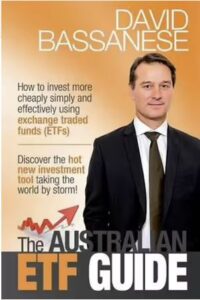I chose to review Guide to Australian ETF’s – How to invest more cheaply and effectively using exchange traded funds (ETFs)by David Bassanese after hearing David speak at one the Australian Investor’s Association information sessions regarding the economic outlook for Australia.
David Bassanese is the Chief Economist of BetaShares,( http://www.betashares.com.au ) one of Australia’s leading managers of ETFs. He discusses the ETFs of all major players in the Australian market. By reading this book you will be absolutely spoilt for choice when it comes to selecting ETF’s suitable for your portfolio and risk profile.

ETF’s are a relatively new investment product in the Australian investment arena, but over the last ten years they have started to capture the imagination of the retail investor. Some of the main reasons for this growth, are the transparency, liquidity and low management fees.
ETF’s are bought and sold on the ASX, and as such can be treated in the same way you would purchase a share. The value for the investor, is that instead of having to spend time selecting and managing a portfolio of shares, property, bonds and cash, one can purchase an ETF for a specific purpose and that portfolio will be managed for a relatively small fee.
There are hundreds of ETFs and similar products available on the Australian market covering most assets. To give an example BetaShares alone has over 40 ETFs, which according to their website fit into the following categories:
- Australian Shares
- Equity Income
- Managed Risk
- Short
- Commodity
- Geared
- International Shares
- Cash and Fixed Income
- Global Sectors
- Currency
- Active
There are three major reasons for reading this book regardless of whether you currently own ETFs or plan to do so in the future.
You should not invest in anything you do not understand and this book should fill any gaps in your knowledge. David has explained in simple plain English all you need to understand about ETFs and similar products. He goes into great detail advising you on the advantages and pitfalls of ETFs and how some products may look the same, but are actually quite different.
The second reason is universal, regardless of whether or not they plan to invest in ETFs or not. As each type of ETF is described, David gives the reader a detailed description of where that type of ETF should fit within an investment plan.
As an experienced share investor, I constantly found myself thinking of ways in which I might incorporate these investment strategies into my personal financial plans. I also started to see that while I would never give up my share trading, it would make a lot of sense to have a portion of my everyday share portfolio held in ETFs. It would save a lot of time and the results after costs are likely to be similar for the more basic investments which make up the bulk of any portfolio.
Finally, the third reason is for those who want to buy ETFs. This book gives you a great deal of detail about some of the best ETFs available. I believe that there is sufficient information, about specific ETFs, including their ASX code, that you could simply construct an investment portfolio of ETFs from those referenced in the book. If you have a preferred service provider, you should be able to locate a list of ETF’s provided by that company and again start to construct a portfolio of ETFs. For many, it is likely to be a matter of simply choosing an ETF for the ASX 200.
For the beginner investor, ETF’s are an easy way to get started on the investment ladder, adding regularly to your portfolio at minimum cost. In the meantime, you can be reading and building up skills to take a more active role in the management of their investments.
In my eBook, Map Your Finances, the conclusion lists Ten Top Tips for investing. The last of these is to continually educate yourself in regards to money management and investments.
I believe the Australian Guide to ETFs is a book that deserves a place in the library of all investors, regardless of whether or not they plan to invest in ETFs.
Glenis Phillips, SF Fin – Good Financial Reads
Disclaimer: Financial Mappers does not have an Australian Services License, does not offer financial planning advice, and does not recommend financial products.







